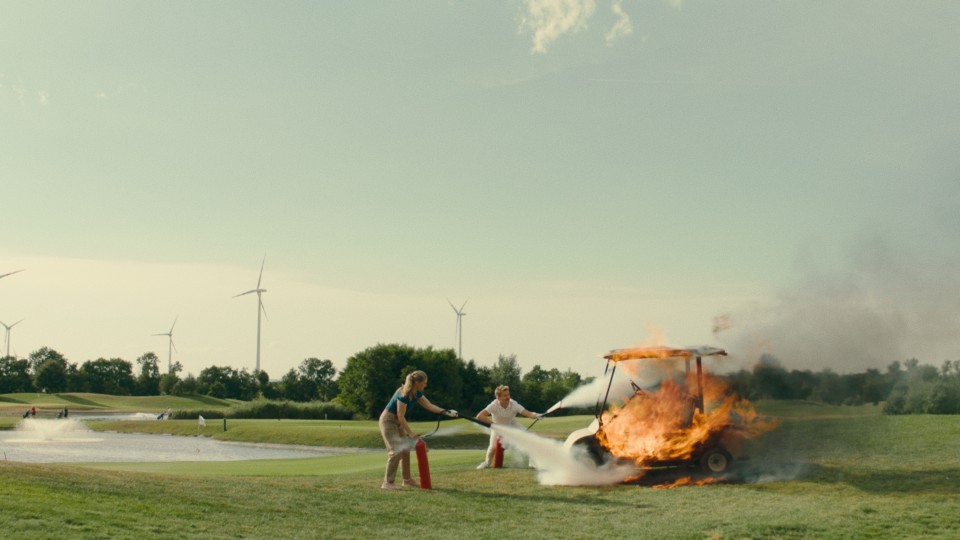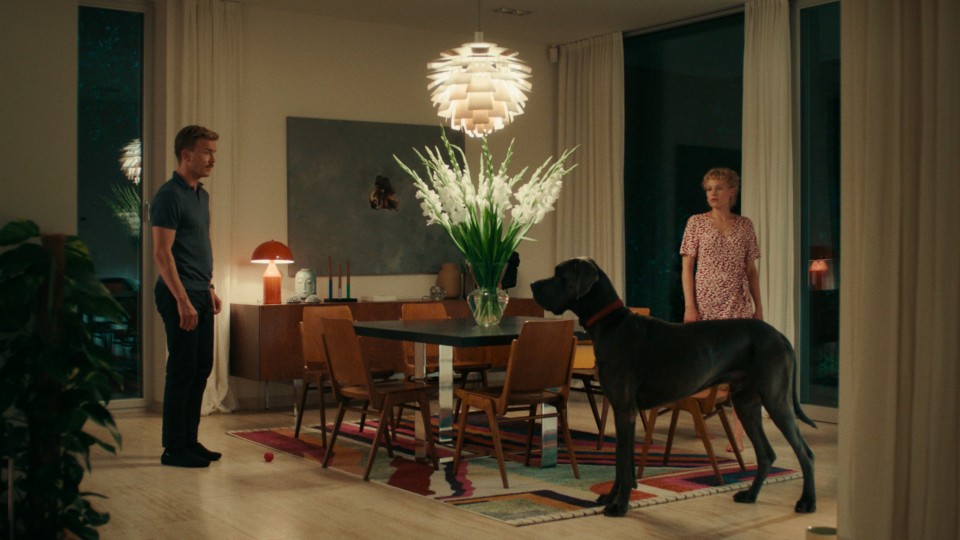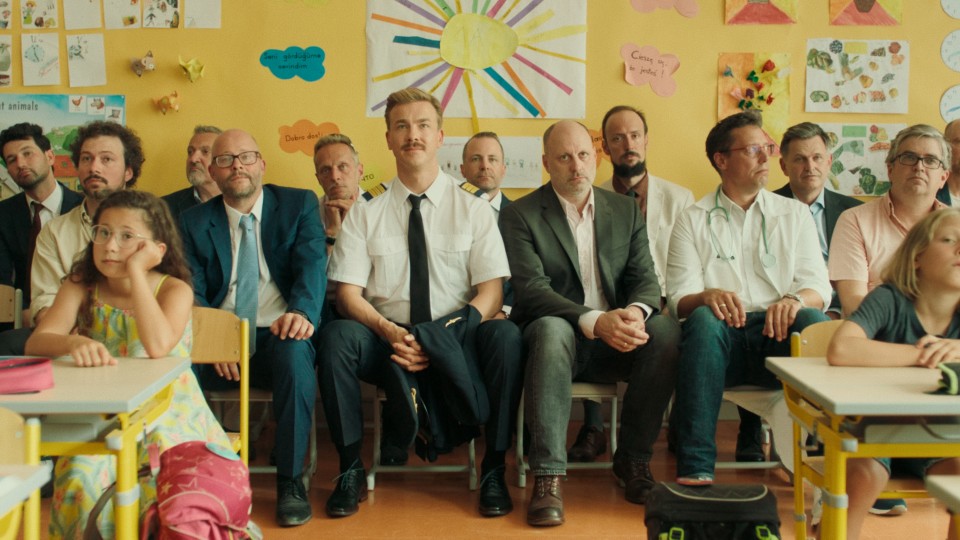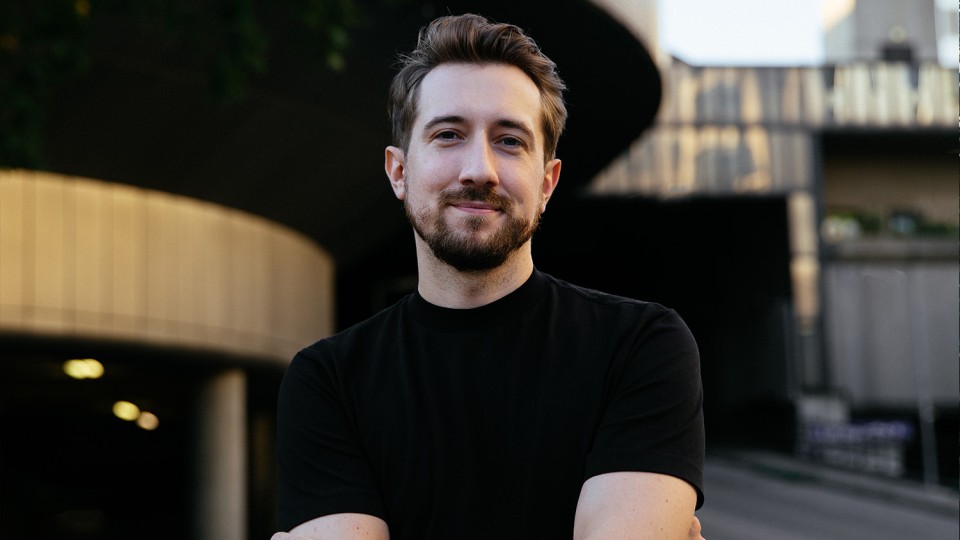Friendship, status, civil courage. There is no social marker that can’t be scrubbed up very nicely for someone prepared to
pay the My Companion fees. Matthias is the top performer at the agency. He expertly adopts a new identity for a few hours
every day, acting the role of the educated companion at a concert, the exemplary son visiting from overseas or the dad in
a pilot's uniform. But he’s helpless when it comes to simply being himself within his own four walls. Bernhard Wenger's feature
film debut PEACOCK spans social surfaces and traces the fault lines between the real and the fake with satirical humour.
PEACOCK has a main character whose profession is to cut a perfect figure in any context. Was one of your initial ideas to
create in Matthias a person the way our capitalist economic system would most like him to be: the human being whose only aspiration
is to function perfectly? What thoughts did you have about the main character?
BERNHARD WENGER: Matthias functions in accordance with society’s norms; he knows exactly what it takes to be the perfect son or partner for
an assignment. He is charming and perfectly prepared for his roles, and within these settings he also knows how to react.
His private life, on the other hand, which he has to live without any preparation or precise instructions, doesn’t work that
way. His problem is that in real life he has to play someone else every day. People who work for Rent-A-Friend agencies aren’t like actors on a set or a stage, when everyone around knows they’re acting. In this case, only the client
and the agency staff know. In real life, you would never expect someone to be a rented “friend”. That's why employees of Rent-A-Friend agencies plunge so deep into their assignments – because it's not really acting; they actually live the characters. Just like
people in other professional groups, Matthias has to close himself off emotionally to avoid developing genuine feelings when
he plays a father, son, partner... whatever. As a result, he has reached the point where he no longer knows how to feel and
live real emotions.
Being the perfect other is a profession of our day, when it has also become a challenge to work on having the perfect self.
BERNHARD WENGER: Exactly. Of course, it's also the case that we all constantly take on roles in our daily lives. But for many people, professionally
as well as privately, this trend has now undergone a huge expansion. On social media in particular, people present their private
lives as being far more glamorous, appealing, successful and positive than they actually are. Very few people post negative
things on social media; you always want to show your best side. And this happens in real life, too. Hardly anyone gives an
honest answer when asked "How are you?". People rarely admit to having a bad day; they’d rather say: "I’m fine, thanks, and
you?”. I believe our society is becoming more and more artificial and superficial in this respect. Rent-A-Friend agencies are the extension of all this.
Your setting here is anchored in an affluent society where only emotional, psychological or intellectual elements are lacking.
But even what supposedly can't be bought can be turned into money by service providers. What sources of inspiration did you
have for the My Companion agency?
BERNHARD WENGER: In 2014, I became aware of Rent-A-Friend or Friend-For-Hire agencies, which have existed in Japan for almost two decades. They were created there in response to people’s overpowering
isolation and loneliness. People who don't have anyone can hire a person to go for a coffee, to chat with. The original idea
was to help people. But as is often the case, these agencies are also very often used to spice up someone’s image, to cover
up lies, to demonstrate power. It would work the same way in our society. Our world, especially that of my generation, is
very much shaped by social media. Superficiality is becoming increasingly pronounced, and Covid made isolation more of an
open problem here as well. There is already an international agency in Vienna where you can rent people. It's more about renting
someone for city walks to discover their "individual" Vienna, or going out for a drink with a "friend from Vienna". I don't
think it will stop there; I think it will gain ground in our country, too.
What form did your research in Japan take?
BERNHARD WENGER: I went to Japan in 2018 for research, to meet agency employees and interview them about their profession and their assignments.
I learned a lot of details about how the jobs work, how employees prepare and what they are rented for. In some cases, the
assignments were actually much too absurd to be featured plausibly in a film. One person opened up to me a lot and said that
the more she practices this profession, the greater a problem she encounters in knowing who she actually is. I found that
idea so fascinating and tragic that I adopted it for my main character and built the bizarre story around it.
PEACOCK also depicts the way women and their attitudes change. Female characters such as Sophia, Ina, Vera and the plumber
shake up conventional ideas about how society functions. To what extent would you like to bring other arrangements into play
that are unusual for the patriarchal system?
BERNHARD WENGER: In my opinion, these conventional modes of operation are outdated. The female characters in the film bring qualities to bear
that Matthias doesn’t possess. Both Sophia and Ina know what they want. Matthias doesn't. Matthias embodies an insecurity,
a feeling of being lost. By way of contrast, there are self-confident female characters who have a clear goal in mind. It
remains unclear to what extent he was once different and how much is left of a former Matthias deep inside.
On the one hand, PEACOCK is about pulling off a satire, but on the other hand, it's also about keeping the tipping point between
fake and real in a state of suspension. What were the challenges in the screenwriting process?
BERNHARD WENGER: I started working on the script in 2018. It was difficult to get across the idea of an agency like this without going into
too much detail, because these agencies don’t exist in our country yet. The second challenge was to bring the character of
Matthias closer to the audience. Of course, it's hard to make such a passive, lost main character completely comprehensible
and likeable. I like to work with quirky, subtle humour. Humour only works when tragedy is present. The basic problem of someone
who can’t feel real emotions is actually more of a tragic one.
The question of possible influences on your work from European cinema and Austrian auteur films is prompted by both the screenplay
and also your visual language.
BERNHARD WENGER: In my youth I was very strongly influenced by Scandinavian cinema and black English humour. This, in combination with the
basic Austrian sense of tragedy that we all have, is at the root of my signature. I wouldn't name individual role models;
it’s more that I see satire in general as a cinematic technique which has a lot of potential. During times when we are struggling
with major social and political problems worldwide – those addressed in the film and others – I think humour is the tried
and tested way to address these subjects.
Matthias has a profession which means in practice acting to the extreme. He not only has to play someone else; he has to convey
plausibly that he really is a different person. How did the casting of Albrecht Schuch come about?
BERNHARD WENGER: I am very grateful for my large and wonderful cast. First and foremost Albrecht Schuch, who is incredibly versatile and adaptable.
That’s so crucial, because the character of Matthias also takes on so many different roles. The actor playing Matthias had
to master this art. I think the most difficult thing for an actor is to play a passive character for an extended period, not
really being able to react emotionally to his environment and all the absurdity that is going on. For such a character in
particular, who is so extraordinarily different, he struck me as just the right person.
The other roles are also played by prominent actors: Julia Franz Richter, Anton Noori, Maria Hofstätter, Branko Samarovski...
How did you prepare with your cast for the work of acting in this first feature film?
BERNHARD WENGER: Once I have devoted a great deal of time to writing the screenplay, which I consider the absolute basis of the film, I stick
to it very closely during the shoot. Working with such great actors is incredibly fantastic, because you can count on being
able to get down to details right from the start. The atmosphere on the set is so good, you can then work together on nuances
in order to bring what has already been worked out in meetings and rehearsals to a high level. I think the most important
thing is that despite the social superficiality prevalent in the film, ultimately you see that there are other ways to live
than in Matthias' agency world.
The set design is also visually impressive. You construct a relationally dystopian world in a very aesthetic world. A dystopia
that doesn’t look like one. How did this work develop?
BERNHARD WENGER: Working together with Katharina Haring was great. We invested a lot of time in location searches. The fact that the main
character, Matthias, lives in a modern, quite cold house was right for the story. But we tried not to add more dystopian coldness
through the set design; instead, we wanted there to be warmth and variety in this superficial world. Historic buildings form
a contrast to Matthias' home and the MuTh concert hall. I also like to break with classic Austrian motifs. I wanted to show
places that are not directly connected to Vienna, because the story could take place in any major city. Production design,
costume and cinematography have a great influence on the bizarre tone of the film, because the humour is also very visual.
How did it come about that your first feature film is named after the peacock?
BERNHARD WENGER: The peacock is a creature that can’t do much except look beautiful. Peacocks can’t fly far and don’t fly well. They emit
a terrible scream. Metaphorically, it represents Matthias, who can create a very good appearance, but under the surface there’s
very little else. Very little that’s real, above all. At least, at the beginning of the film.
Interview: Karin Schiefer
July 2024
Translation: Charles Osborne







